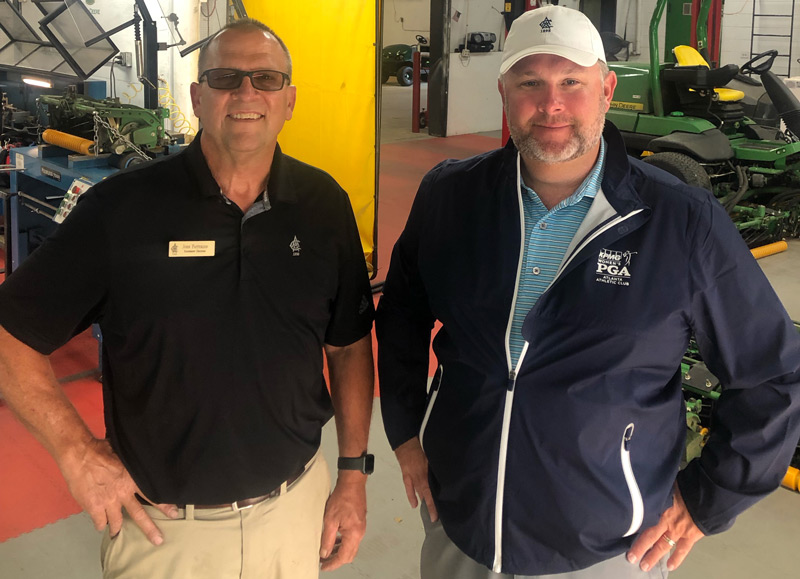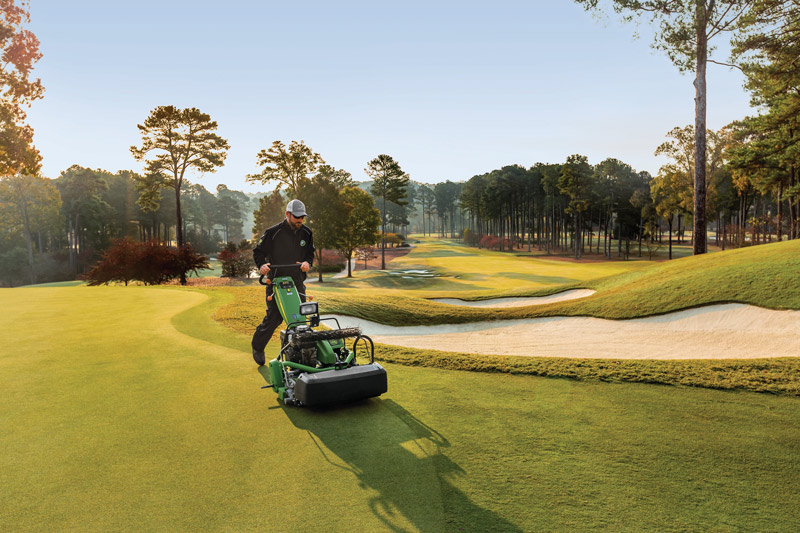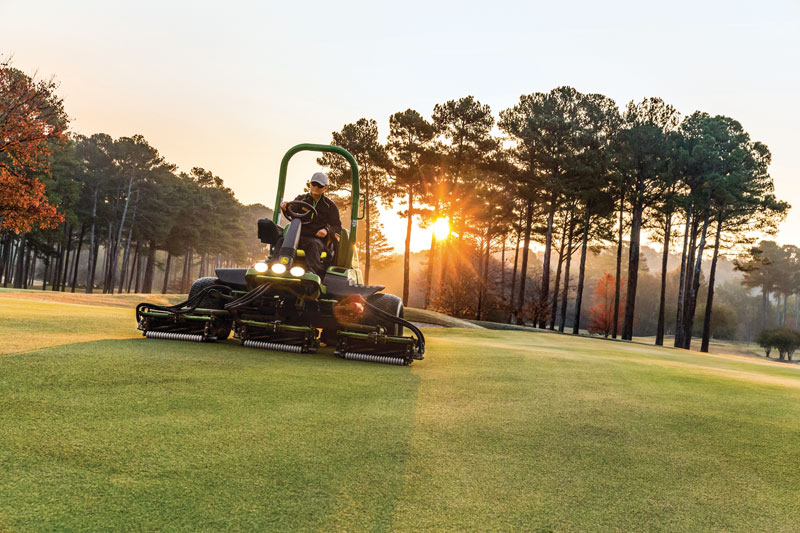
Atlanta Athletic Club equipment manager John Patterson (left) and director of agronomy Lukus Harvey. Photos courtesy of Atlanta Athletic Club
Championship golf has been a part of the DNA of Atlanta Athletic Club since its founding in 1898.
Between its original location near downtown Atlanta (now East Lake Golf Club) and its current location in suburban Johns Creek, Ga. (where it moved in 1967), the club has played host to five major championships. That list doesn’t include the many other prominent tournaments contested at AAC, most recently the Arnold Palmer Cup in 2017.
But since hosting the PGA Championship in 2011 and the U.S. Amateur in 2014, the club has largely been absent from the big-time, televised-golf-tournament stage. That changes this week with the KPMG Women’s PGA Championship, and the men charged with leading preparations of the club’s Highlands Course for that event — director of agronomy Lukus Harvey and equipment manager John Patterson — are ready for the spotlight.
“There is a ton of excitement among both our team in the maintenance department and the club’s membership,” says Harvey, a 20-year GCSAA member who has been at AAC since 2015. “Everybody understands how special the opportunity is to get back on the world stage and that not every club gets this chance. So, that has everybody really excited, especially with it being the Women’s PGA Championship and to be out there on the forefront of women in sports.”
Patterson, a seven-year member of GCSAA who joined the AAC team in 2014, agrees. “The guys in the shop are really amped up ... and everybody is really very positive overall and itching to get things started.”
GCM sat down with Harvey and Patterson in advance of the Women’s PGA Championship to discuss preparations for the tournament, their relationship with equipment provider John Deere, how they navigated the coronavirus pandemic, and more.
GCM: Have there been any significant changes to the Highlands Course since the PGA and U.S. Amateur that you would highlight to someone who is curious about golf architecture, conditioning and playability?
Lukus Harvey: Absolutely. We did a renovation in 2016. We took out about an acre’s worth of bunker square footage, so some of the bunkering looks different. Around all the greens complexes where we removed bunkers kind of created these roll-off, shortly mown chipping areas that are really great. Fourteen green was definitely a challenge in terms of finding pinnable locations, so that was completely blown up and redesigned. And then the whole place was regrassed. We still have a really good bermudagrass combination, so TifEagle bermudagrass on the greens. We went away from the Diamond zoysiagrass on tees and fairways and now have Zorro zoysia on those areas, so you still have kind of that “wow” factor and that contrast. It will play very similar to the past, but it’s got a little bit of a different look, especially the greens complexes.
GCM: I’ll direct this question to John: Obviously preparing for any major event requires a ton of teamwork, not just within your own group, but also externally with outside vendors, volunteers, etc. How have you worked with those parties — most notably John Deere and your local distributor, Greenville Turf — in the run-up to this event, and what has your planning process looked like specific to equipment prep for the tournament?
John Patterson: We’re lucky to have 36 holes here, so we’re primarily using our own mowing fleet for the tournament. Where they’ve really helped us out is with vehicles, because we have so many people that we needed help just getting bodies around the golf course. So, we’re relying on them primarily for people movers and utility vehicles, but all of our mowing equipment is in-house.

We maintain our cutting units and our mowing equipment, in general, to a very high standard anyway, so we’re not really doing anything different as far as setup goes. We’re just looking at things more often, putting more eyes on it. We always inspect every piece of mowing equipment after every use, but now we’re running the equipment more, so it’s just a higher frequency of maintenance.
We have volunteers in the shop from our grinder manufacturer, and a student with his first real go-around with tournament prep, so that’s really fun to share the experience with them. They add to the excitement in the shop, and it keeps you sharp because you get the questions all the time that make you think about things that might have become routine to you. Their curiosity really keeps you on your toes and revisiting some of those things.
GCM: John, how have advances in equipment technology — for example, John Deere’s GPS PrecisionSprayer and the TechControl displays on its A-model mowers — changed your job as an equipment manager, both in your day-to-day work and in your preparations for the Women’s PGA Championship?
JP: The implementation of the technology that we have now with the John Deere equipment has been really seamless. Things just work, and if there ever is an issue that pops up, we’re able to diagnose it very, very simply and take care of it.
For example, the TechControl itself has really been beneficial to standardize the operation of the machines. We know that the mowing speeds are consistent. The turn speeds are consistent, so we’re not scuffing the rough, for example, on the fairway mowers when they go to make their turns. So, I really like that feature and employ that in all my units wherever possible.
LH: To add on to the technology question a little bit, and I know that John would agree, but the GPS-guided sprayers ... we’re talking about a whole different level of confidence for us. We’ve literally been out every day making supplemental applications for the fairways and the rough. Having this technology and being able to put what you want where you want and at such an accurate rate has allowed us to spray into advance week. We’ll even spray as late as Monday or Tuesday before the tournament starts with total confidence because of the reliability of the equipment and the technology.
GCM: How did the pandemic affect your operations at Atlanta Athletic Club, Lukus? Was there any impact on your preparations for the KPMG Women’s PGA because of restrictions or quarantines?
LH: Like for everybody, it was quite a wild ride. When it first happened, the club shut down for six weeks. No one really knew what was going on at that time, but I think our board made a very, very wise decision to shut down for that time. Our team was able to keep working — we actually executed a practice facility renovation during that time — and then gradually, we eased back into it.

It sounds funny, but it was also a learning opportunity for us. Some of it was the normal stuff that everybody else learned — how to be more efficient, different labor practices, things like that. But we learned other things agronomically here — and when I say learned, it’s things we already knew, but it actually gave us the opportunity to prove it, to reinforce that for the membership.
For example, they saw what happens when there are no carts. With us being in the transition zone, warm-seasons turf comes out of dormancy in that March, April, May time frame. Well, they saw a golf course that they’d never seen from a day-to-day standpoint. We didn’t have any cart traffic because when we did reopen, we reopened to walking only. So it was great because now the board and the membership saw the benefits of reduced traffic and have embraced that idea. That’s going to be the standard going forward. Once spring green-up starts ... they fully support a three- to five-week period where we go cart path-only, just to let the turf come out of dormancy and be healthier.
GCM: What sort of staff will you have at your disposal during the tournament? How many volunteers do you have coming in, and have you had to restrict that at all because of the pandemic?
LH: Fortunately, we haven’t been restricted in regard to staffing because of the pandemic. We’re also fortunate that we’re a multi-course facility, so we have a staff of 65 year-round. And after the PGA officially takes ownership of the club (on Friday of advance week), nothing else is open other than the Highlands Course, so we’re able to use everybody for tournament activities. We will have about 20 volunteers coming in, so all told, we’ll have between 80 to 85 around here. It’s not a huge number, but it is the right number for us so we don’t have people climbing over each other. And the core of that group is our team, who live and breathe this place every day. That takes some of the burden off us in terms of training and orientation.
JP: In the shop, I have my two assistants and then I will have two volunteers — Anthony Herzog from East Lake and Mike Rollins (with grinder manufacturer SIP Corp.). We’ll also have a young man, Wyatt Harris, who is up from Four Seasons Orlando, who will help us out. And that’s pretty much who will be running the show in the shop area.
We’re going to have the day set aside to take care of the machines that will be used in the evening, and vice versa for the machines that will be used in the morning. We have the depth of equipment that we need to rotate pieces out as needed. And we should have everything dialed in and just be tweaking here and there.
The 2021 KPMG Women’s PGA Championship: Golf course facts
The 2021 KPMG Women’s PGA Championship will be held June 24-27 on the Highlands Course at Atlanta Athletic Club in Johns Creek, Ga.

The grass
Greens: TifEagle bermudagrass maintained at .100 inch
Tees: Zorro zoysiagrass maintained at .350 inch
Fairways: Zorro zoysiagrass maintained at .350 inch
Rough: Tifway 419 bermudagrass maintained at 2.25 inches
The course
Year built: 1965
Architect: Robert Trent Jones Sr.
Renovation: Rees Jones in 2016
Par: 36-36—72
Yardage: 6,740
Stimpmeter: 12
The staff
Lukus Harvey, director of agronomy
Trent Inman, CGCS, superintendent
DC Plake, senior assistant superintendent
John Patterson, equipment manager
Francisco Morales, horticulturist
Bud Taylor, director of golf
Number of employees: 65
Number of tournament volunteers: 20
Scott Hollister is GCM’s editor-in-chief.